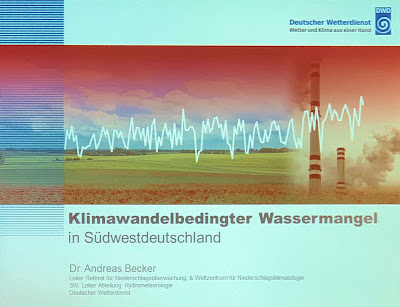There has been no rain of blogs recently, a drought that I will not compensate
for by heavy rainfall. Personal reasons gave me little time for writing, and the
circumstances did not encourage me either. But yes, I am back at last.
Droughts and heavy rainfalls are consequences of the climatic change we live
through. These two weather phenomena are increasingly observed globally.
Last week, Red Baron listened to two talks in the framework of the
Freiburger Umweltgespräche (Freiburg Environmental Talks) organized at
the local Jazz House.
In his presentation about climate change and water shortage in Germany's
southwest, Dr. Andreas Becker of the German Meteorological Service presented
measured "hard" data but refused to paint horror scenarios.
Here is a global map of greenhouse gas emissions, showing the pattern one would
expect. The consumption-friendly Western countries and the populous economies of
China and India stick out.
Dr. Becker presented the increase in CO
2 concentration in the air
from a measuring station at the Mount Loa Observatory in Hawaii, which serves as the world's reference point. Recently, a record "air mark" of 415 ppm was
exceeded.
"As recently as 1910, atmospheric CO
2 stood at 300 ppm – higher
than it had been for some 800,000 years at least* – but jumped up another
100+ ppm over the next century as pollution levels skyrocketed."
*Measured in drill cores from ice layers
For the future, Dr. Becker presented two scenarios to choose from: If the
signatories of the Paris Climate Agreement take active countermeasures against
CO
2 emissions, a value of 400 ppm could be capped by 2100.
Taking no measures will extrapolate the CO
2 concentration to
1370 ppm in the same year.
Regarding the total amount of rain in Baden-Württemberg, the
region still seems well off.
On a global level, however, observed climatic changes are dramatic. The ice
around the North Pole is melting rapidly, as shown by the decrease in the
surface covered by ice from 1980 to 2018. The albedo of the white snow
reflecting the solar radiation becomes lower, further heating up the sea, and
the cold mass of ice diminishes.
At first look, these effects alone may not seem of great concern, but to say
it with a quotation from Schiller's drama Wallenstein:
The curse of an evil deed is propagating and will bring forth evil. In
fact, climatologists recently observed - with the temperature difference and
gradient between the Arctic and the equator region becoming smaller - a
weakening of the powerful jetstream. This leads to stable and stationary
weather conditions around the globe, causing either persistent rain or long
periods of heat and drought, precisely the climate Germany's southwest
had lived through last year.
Dr. Becker said that 2018 - shown on the slide with a mean temperature of
more than 3 degrees too warm and 40% less precipitation than the mean -
was still an exceptional year.
Again, while the total amount of rain from April to October shows no
decreasing trend, air temperatures increase due to the increasing sunshine duration.
The drought in the region is caused by increased water evaporation at higher
temperatures. It is further accentuated by warm and dry southern winds
streaming through the Belfort Gap along the Rhine Valley and sweeping the
water vapor.
The balance between precipitation and evaporation looks particularly grim for
the region around Berlin.
Professor Markus Weiler's talk was somewhat technical and concerned about
heavy rainfall and town flooding. I only retained one of his slides
showing a persistent local depression, i.e., a rain cell of only
10 kilometers in diameter but stationary for one hour. It had
precipitation of around 50 mm, destroying the nearby town of Braunsbach
by flooding.
As early as 2008,
Red Baron reported on climate change at a Stammtisch of the Freiburg-Madison Gesellschaft. I accentuated the
topic further in
2014
and
2015, harping on the Energiewende (energy system transformation).
We cannot escape. Climate change is real!


















